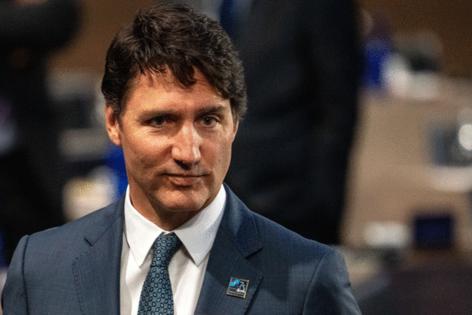Canadian Prime Minister Trudeau unveils $4.5 billion in tax breaks, rebates supported by opposition party
Published in News & Features
OTTAWA, Canada — Prime Minister Justin Trudeau announced a C$6.3 billion ($4.5 billion) affordability package that includes temporary relief on the federal sales tax and a one-time C$250 rebate to more than 18 million Canadians.
The plan has the support of the New Democratic Party, an opposition party that pulled out of a power-sharing deal with Trudeau’s government earlier this year. The agreement on the tax-and-rebate package shores up the government’s stability in parliament, reducing the likelihood of an early election.
The measures are also aimed at rebuilding support for Trudeau’s Liberal Party, which is languishing far behind its Conservative Party rivals. Cost-of-living concerns and housing costs are dragging down the prime minister’s popularity, opinion polls suggest.
“Our government can’t set prices, but we can give Canadians, and especially working Canadians, more money back in their pocket,” Trudeau said in a news release.
Beginning Dec. 14, the government will scrap the federal goods and services tax, known as the GST, on a range of items until Feb. 15, the release said. That includes grab-and-go meals, restaurant bills, snack items, alcohol, children’s clothing and toys, books, newspapers, puzzles and Christmas trees.
The total cost of the temporary GST removal is C$1.6 billion, the release said.
The tax break does not go as far as NDP Leader Jagmeet Singh had called for — he wanted to see the removal of the GST on home heating and other monthly bills. But he said his party will support it in parliament.
“The NDP will vote for this measure because working people are desperate for relief, and we’re proud we delivered for them again,” Singh said in a statement. “Then we will campaign hard on permanently scrapping the GST on daily essentials and monthly bills, like we already promised.”
The more expensive measure is the rebate checks, which will go out in the spring to working Canadians who earned less than C$150,000 in 2023. As many as 18.7 million Canadians qualify for the rebate, the government said, which brings the total cost of the transfer to C$4.7 billion.
At least temporarily, the NDP’s vote on the affordability package will clear a parliamentary deadlock that has stretched for two months, as Pierre Poilievre’s Conservative Party has halted the progress of all legislation through procedural tactics.
But Singh told reporters that his party will only support ending the impasse for a day in order to pass the affordability package, which could mean parliament returns to gridlock afterward.
For his part, Poilievre slammed the government’s announcement as meaningless given the sharp increase in housing costs and food inflation over the past few years, as well as the national carbon tax Trudeau brought in.
“Nobody believes Justin Trudeau and Jagmeet Singh after they’ve impoverished our people and made life worse off,” Poilievre said, repeating his call for an election over the carbon tax.
The package will raise questions about the cost to the federal treasury. Canada’s budget watchdog has already warned that Trudeau’s government is blowing past its self-imposed fiscal guardrails.
Parliamentary Budget Officer Yves Giroux expects the federal government ran a deficit of C$46.8 billion ($33.5 billion) in 2023-24 — deeper than the C$40 billion forecast by Finance Minister Chrystia Freeland in the April budget. The government has not yet released its final numbers from the past fiscal year.
_____
(With assistance from Monique Mulima and Erik Hertzberg.)
_____
©2024 Bloomberg L.P. Visit bloomberg.com. Distributed by Tribune Content Agency, LLC.







Comments